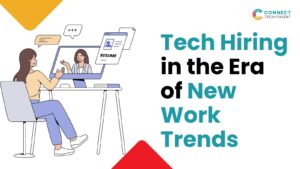Navigating the tech hiring landscape can be a daunting task, especially when searching for a candidate who brings both technical prowess and the right behavioral attributes to the table. But worry not! Behavioral interviewing is here to save the day.
In this blog, we’ll dive into 5 powerful ways to leverage behavioral-based interviewing techniques, ensuring you strike the ideal balance between candidates’ aptitude and technical skills. So, prepare yourself to unlock the hidden potential of behavioral interviewing and revolutionize your tech hiring process like never before!
1. Evaluating Candidates Commitment
Commitment is a crucial trait in tech roles, as it ensures that individuals are dedicated to their projects, teams, and the company’s long-term vision. By using behavioral interviewing techniques, you can effectively assess a candidate’s commitment to their work and the organization. As you navigate the behavioral vs technical interview landscape, here are some valuable tips and questions to help you gauge commitment in your tech candidates:
- Ask open-ended questions: These questions will allow candidates to reflect on their past experiences and share examples of their commitment. Try asking:
- Can you describe a situation where you went above and beyond to achieve a project goal or meet a deadline?
- How have you demonstrated long-term commitment to a project or a team in your previous roles?
- Tell us about a time when you encountered significant challenges or setbacks in a project. How did you stay committed and work through them?
- Focus on real-life examples: Behavioral based interviewing emphasizes the importance of evaluating candidates based on their past experiences. Encourage candidates to share specific instances where they showcased their commitment to a project, team, or the company as a whole.
- Interpret responses effectively: To make the most of these interview techniques, pay close attention to the details shared by candidates. Look for signs of:
- Perseverance in the face of challenges or obstacles
- Willingness to go the extra mile to achieve goals
- Dedication to the team or company values and objectives
2. Assessing Attitude and Cultural Fit
A positive attitude and strong cultural fit are essential in a tech environment, as they foster collaboration, innovation, and overall team harmony. Behavioral interviewing techniques can help you uncover these traits and identify candidates who will seamlessly integrate into your organization. As you continue to balance behavioral vs technical interview methods, here are some key aspects to consider when assessing attitude and cultural fit:
- Craft targeted questions: To measure a candidate’s attitude and cultural fit, ask questions that prompt them to reflect on their past experiences and interactions with colleagues. Some examples include:
- How would you describe your ideal work environment or company culture? How have you contributed to creating such an environment in your previous roles?
- Can you tell us about a time when you had to adapt to a significant change in your team or workplace? How did you handle it?
- Share an instance where you had a disagreement with a team member. How did you resolve the conflict and maintain a positive working relationship?
- Encourage specific examples: Behavioral based interviewing places an emphasis on learning from candidates’ real-life experiences. Urge applicants to provide concrete instances that showcase their attitude and adaptability in various work situations.
- Analyze responses carefully: In order to effectively leverage these interview techniques, it’s crucial to read between the lines of candidates’ responses. Pay attention to indications of:
- Flexibility and openness to change
- Positive interactions with colleagues and team members
- Alignment with your company’s values and culture
3. Analyzing Team Collaboration Skills
In the fast-paced world of tech, teamwork is an indispensable element that drives projects to success. To ensure that your new hires possess strong collaboration abilities, behavioral interviewing techniques can be a game-changer. As you navigate the behavioral vs technical interview terrain, consider the following tips and questions to assess team collaboration skills:
- Pose collaboration-focused questions: To evaluate a candidate’s ability to work effectively with others, ask questions that prompt them to reflect on their past teamwork experiences. For instance:
- Describe a project where you collaborated with a diverse group of team members. How did you contribute to the team’s success?
- Can you share an example of when you had to collaborate with a difficult team member? How did you handle the situation and ensure the project’s success?
- Tell us about a time when your team faced a significant challenge. How did you work together to overcome it?
- Request specific examples: Behavioral based interviewing revolves around understanding candidates’ real-life experiences. Encourage applicants to provide concrete instances that demonstrate their ability to work well with others and contribute to a positive team dynamic.
- Identify key indicators of strong team players: When analyzing responses, look for signs that reveal a candidate’s collaboration skills and ability to contribute to a successful team environment. Pay attention to evidence of:
- Effective communication and active listening
- Adaptability and willingness to compromise
- Empathy, support, and understanding towards team members
4. Gauging Learning Ability and Adaptability
The tech industry is renowned for its rapidly changing nature, making it essential to hire candidates who can adapt, learn, and grow with your organization. Behavioral interviewing techniques offer an effective way to assess learning ability and adaptability in potential hires. As you continue to balance behavioral vs technical interview approaches, consider the following suggestions and questions to gauge these vital traits:
- Ask learning and adaptability-focused questions: To evaluate a candidate’s capacity to learn and adapt, pose questions that encourage them to reflect on their past experiences. Some examples include:
- Can you describe a situation where you had to learn a new technology or skill quickly to complete a project? How did you approach the learning process?
- Tell us about a time when you faced unexpected challenges in a project. How did you adapt and overcome those challenges?
- Share an instance where you had to adjust your approach to accommodate new information or changing circumstances. What did you learn from that experience?
- Encourage specific examples: Behavioral based interviewing emphasizes the importance of understanding candidates’ real-life experiences. Urge applicants to provide concrete instances that showcase their ability to learn, adapt, and grow in various work situations.
- Look for growth-oriented indicators: To effectively utilize these interview techniques, it’s crucial to recognize the signs of candidates who can grow with your organization. Keep an eye out for evidence of:
- A willingness to learn from mistakes and embrace feedback
- A positive attitude towards change and continuous improvement
5. Understanding problem solving and conflict handling skills
In the dynamic tech industry, problem-solving and conflict-handling skills are indispensable for navigating the challenges that arise within projects and teams. Behavioral interviewing techniques provide an effective way to assess these crucial skills in potential hires. As you strive to balance behavioral vs technical interview methods, consider the following tips and questions to uncover candidates’ problem-solving and conflict-handling abilities:
- Pose problem-solving and conflict-handling questions: To evaluate a candidate’s capacity to tackle challenges and manage conflicts, ask questions that prompt them to reflect on their past experiences. For instance:
- Describe a complex problem you faced in a previous project. How did you approach the situation and find a solution?
- Tell us about a time when you identified a potential issue before it escalated. How did you address and resolve it?
- Share an instance where you had to mediate a conflict between team members. What steps did you take to ensure a positive resolution?
- Request specific examples: In line with the principles of behavioral based interviewing, encourage candidates to provide concrete instances that demonstrate their ability to solve problems and handle conflicts effectively.
- Identify key indicators of strong problem-solving and conflict-handling skills: To make the most of these interview techniques, pay attention to signs that reveal candidates’ abilities to navigate challenges and conflicts. Look for evidence of:
- Creative and logical thinking in problem-solving
- Effective communication and negotiation skills in conflict resolution
- A proactive approach to identifying and addressing potential issues
Conclusion
Behavioral interviewing holds the key to elevating your tech hiring process. By skillfully navigating the balance between behavioral vs technical interview methods, you’ll delve beyond candidates’ technical expertise and uncover crucial insights into their soft skills, adaptability, and cultural fit. Leveraging the full potential of behavioral based interviewing techniques empowers you to attract and retain outstanding talent, dramatically reducing hiring costs and propelling project execution performance to new heights. So, take charge and harness the power of behavioral interviewing to secure exceptional professionals who will drive your organization to unparalleled success.




